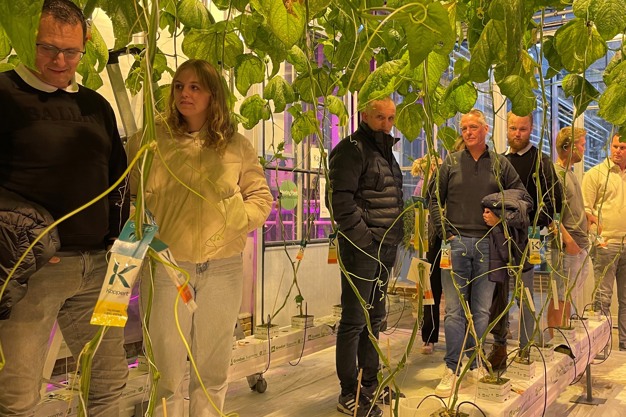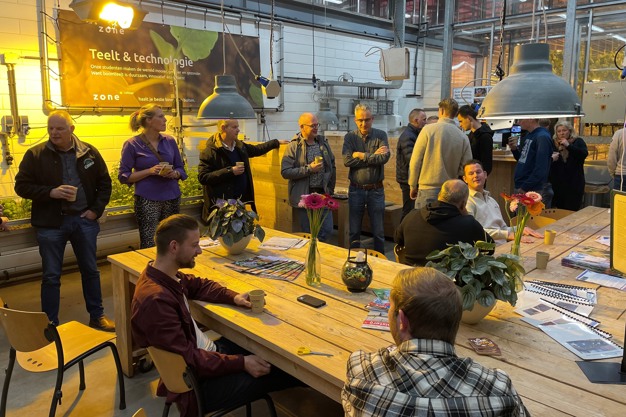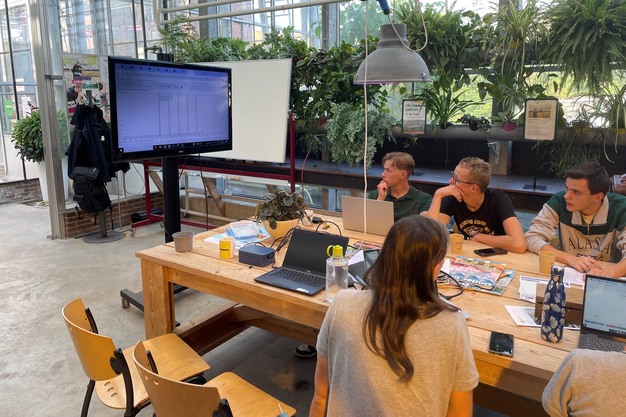On Thursday evening, 7 November, the CIV room at Zone.college filled up for a study club evening organized by study club I-Grow and Centrum Innovatief Vakmanschap (CIV) Groen. The evening started with a presentation by Peter Morrenhof of Delphy on optimizing crop protection and the right choice of agents, followed by Arie Schipper, who took attendees into the world of new growing media. Students from the Cultivation and Technology course gave a presentation on their project "Smart irrigation in cucumbers using AI."

Plant determines itself
On 12 September, students from the Cultivation & Technology course at Zone.college in Zwolle started a trial. Cucumbers are automatically watered using biosensors and AI technology from Vivent Biosignals. AI can detect drought stress and respond immediately thanks to biosensors that 'read' the plants. Whereas previously the grower determined the watering moment, now the plant itself 'determines' when it needs water. The idea behind this is to get a healthier and more vital crop with lower water (and fertilizer) consumption.
Now that the trial has been running for 2 months, the students and Alja van der Schuren, a plant physiologist at Vivent Biosignals, have analyzed the first data. From this, they drew a number of conclusions.

Results
Two days after the start of the trial, the water level in the mats dropped to an alarming level. Student Mathijs Kaashoek: "We saw on the Grosense that the water level of Vivent's mats dropped alarmingly, as high as 35%, while the mats we controlled stayed nicely between 50-60%. Student Leon Meuleman: "The strange thing was that we couldn't see anything on the plants! You couldn't see any difference between Vivent's plants and the control group".
Because the EC in the mats also increased a bit, Vivent adjusted the watering model a bit in response. Student Henri van Haaften: "Currently, Vivent's mats remain about 10% drier than the mats of the control group. Also, Vivent's mats dry at about 5% at night while the control group's mats dry at 8%. And Vivent's plants receive structurally less water".
Together with Alja van der Schuren, the students drew the conclusion that it seems that Vivent's plants adapted to drought stress in the beginning and consequently got a more active root. It also seems that the resulting higher oxygen level in Vivent's mats had a positive effect on the roots.
Student Mathijs Kaashoek very rightly noted that the low water level in Vivent's mats can still be done in autumn, but he is very curious whether this will not cause problems in spring and summer at high irradiation. Student Leon Meuleman: "Plant sap measurements are also taken regularly by Novacrop, but no clear difference is yet visible in this data."
At the moment, Vivent's AI-controlled plants received 15% less water and still produced 20% more cucumbers. Student Henri van Haaften: "Right now, Vivent's results are positive, but we are curious to see what the state of play will be when we finish the trial on 16 December."

The students are very enthusiastic about the trial. They really like the fact that they can now visibly see in a graph what they were taught in theory in lessons at school. For example, the students have been told that every movement of the plant costs growth. In the graphs, the students can now see exactly when they performed crop work. "You immediately see a big drop in the graph, and it takes at least 1 hour for the graph to return to its old level."
They also find the collaboration with Vivent very instructive. Every week they meet online with Alja van der Schuren for at least half an hour (the head office is in Switzerland).
The students: "We feel that we are taken seriously, our comments are addressed, and you notice that Vivent is happy with us because of how we conduct the test and the results!
The growers present in large numbers, found the results interesting and bombarded the students with questions. At the end of the evening, while enjoying a drink, the results were long discussed on the spot in the greenhouse with cucumbers.
All involved are looking forward to the final results in December to see if this technology can actually contribute to more sustainable and efficient cultivation.
For more information:
Zone College
Koggelaan 7
8017 JN Zwolle, The Netherlands
Tel: 088 26 20 500
[email protected]
www.zonecollege.nl
